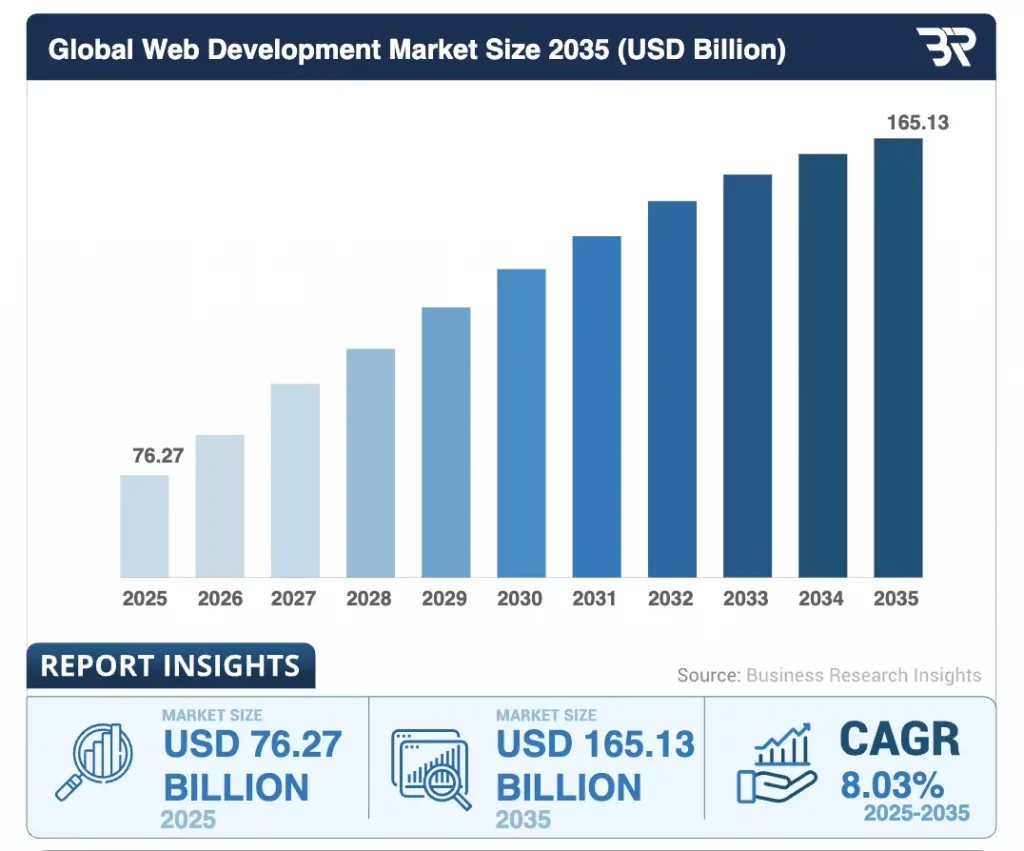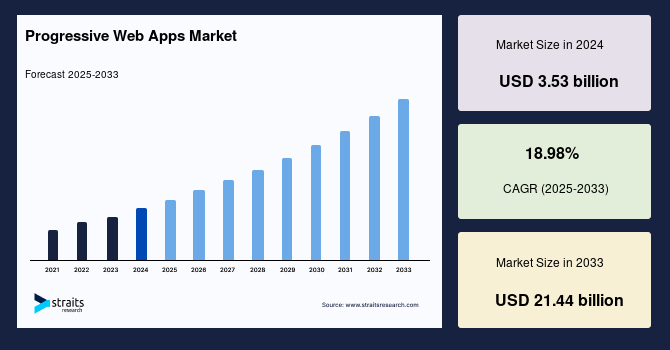Table of Contents
Listen to article
Web application development companies build software that runs directly in a web browser, without requiring installation on a device. Unlike traditional desktop applications, web apps are hosted online, updated centrally, and accessible from any location. Think of tools like Google Docs for real-time collaboration, Shopify for e-commerce, or Trello for project management. They live on the web and provide instant access through a URL.
Web applications are a core part of broader web development services, and today they’re one of the main forces driving digital transformation across industries. The global web development market was valued at $76.27 billion in 2025 and is projected to grow at a CAGR of 8.03% through 2035.

Much of this growth comes from web applications. Companies use them to streamline operations, give teams secure access from anywhere, and keep data centralized. SaaS and product-led businesses depend on web apps to power subscription platforms and customer portals. Cloud adoption lowers infrastructure costs and makes scaling easier, while AI and automation deliver measurable efficiency gains.
The result? Organizations are actively searching for web application development companies that can build solutions to match their exact needs.
If you’re evaluating your options, it’s critical to understand what top web application development companies actually deliver and how to identify the right partner.
What Do Web Application Development Companies Do?
Web application development companies design, build, and maintain browser-based applications that users can access from any device without installations. Some business owners think it’s just coding. It’s not. It’s strategy, roadmapping, development, testing, and support, along with continuous improvements that keep applications secure, scalable, and aligned with business goals.
Typical Service Scope
Here is what the scope of a web application project typically includes:
- Roadmapping and discovery to clarify requirements, select the right tech stack, and align the solution with business goals.
- UI/UX web design to optimize usability and customer experience.
- Front-end development to ensure users get a responsive, intuitive interface on any device.
- Back-end development for databases, APIs, and the logic that powers the application.
- Integrations with third-party systems such as CRM, ERP, or payment gateways.
- Quality Assurance (QA) through automated and manual testing to confirm stability, performance, and security.
- AI-powered features like predictive analytics, natural language processing, and computer vision to enhance functionality and user experience.
- Ongoing testing, deployment, and maintenance to keep applications reliable and up to date.
Advanced Features in Modern Web Apps
Modern web applications now include AI-powered features that make them smarter and more efficient. Automation reduces manual tasks, analytics provide real-time insights, and natural language interfaces or computer vision add intelligence to everyday operations. These capabilities, built through AI development services, turn standard web apps into essential tools for business growth and productivity.
What Services Top Companies Typically Offer
If defining the scope shows what’s involved, understanding the service lines offered by web application development companies helps decision-makers pick the right solution for their specific business problems. Not every organization requires the same solution, and the right choice depends on goals, users, and scale.
Custom Web Development
Your company isn’t like everyone else’s, so why use the same software? Custom web development builds applications around how you actually work, not how some vendor thinks you should work. Your team gets more efficient, makes fewer mistakes, and can scale without hitting software limitations.
Responsive Web Development
Your people use phones, tablets, and laptops. Your customers do too. Top companies make sure web applications adapt seamlessly to any screen size or device. That usually means building with responsive frameworks like Bootstrap or Tailwind, optimizing images and code so pages load quickly, and testing performance across browsers.
Front-End Web Development
The front-end refers to the user-facing elements of a web application. Top companies go beyond visuals, they ensure the interface is fast, accessible, and works consistently across browsers and devices. That often means building with frameworks like React, Angular, or Vue, optimizing performance so load times stay low, and testing layouts so the experience feels seamless on desktops, tablets, and phones.
Back-End and Full-Stack Development
Back-end development keeps everything running behind the scenes. It handles databases, APIs, authentication, and security, making sure the application runs reliably under real-world traffic. Leading web app development companies design scalable architectures in the cloud, integrate with third-party systems, and apply strong data protection practices.
Full-stack teams combine both front-end and back-end expertise, giving you one accountable partner from interface to infrastructure.
Website Development
A company’s website is often the first point of contact for potential customers. Top web application development companies also handle website development, ensuring your brand presence is professional, responsive, and integrated with the right tools. That may include content management systems (CMS), SEO-friendly structures, and connections to marketing or analytics platforms. A strong website sets the stage for customer trust and lead generation.
Web Application Development
Web applications go beyond static websites to deliver interactive functionality. From customer portals to SaaS platforms, they require secure back-end systems, database integrations, and scalable architectures. Leading companies design web apps that handle real-time interactions, integrate with third-party services, and support complex workflows while keeping the user experience simple.
Advanced and Emerging Capabilities
Leading web development companies are integrating next-generation technologies to create smarter, more adaptive digital experiences. AI-driven automation streamlines operations and reduces manual work, while generative AI powers dynamic content creation, recommendations, and design optimization. AI Web developer also utlizes, natural language processing enables conversational interfaces and chatbots, helping users interact more naturally. These advancements make modern web applications more intelligent, efficient, and user-focused.
Top 5 Web Application Development Companies
The companies featured here were selected for their consistent client satisfaction, solid track record in web application development, and recognition on trusted review platforms like Clutch.
Together, they represent a range of options, from flexible partners suited for smaller projects to larger firms capable of handling complex, enterprise-grade web applications across diverse industries.
Scopic
Scopic is a custom software development company with nearly 20 years of experience and more than 1,000 projects delivered worldwide. While the team delivers a wide range of solutions, Scopic is well recognized as a web application development company, creating secure, scalable browser-based applications tailored to client needs. The company works across industries including healthcare, manufacturing, education, media and entertainment, finance, and e-commerce.
With a global team of 250+ experts across time zones, Scopic combines technical depth with flexibility. Instead of pushing rigid, off-the-shelf products, the team adapts applications to match unique workflows. Beyond web applications, Scopic also provides cloud, AI, mobile and desktop development, helping businesses scale securely and efficiently.
Intellectsoft
Intellectsoft is a digital transformation and web application development company founded in 2007. The team helps enterprises adopt new technologies, modernize legacy systems, and build scalable digital solutions. In 2024, the company received multiple awards recognizing its leadership in custom software and application development.
Its services include IT strategy consulting, UX/UI design, and full-cycle development of mobile, web, and enterprise applications. The company also works in IoT system engineering, QA automation, DevOps, and AI-powered solutions. Intellectsoft supports clients across industries such as healthcare, finance, government, hospitality, and eCommerce.
Yojji LTD
Yojji LTD is a web development company founded in 2017 with offices in Poland and beyond. The team builds custom web and mobile applications, supported by expertise in microservices and cloud solutions. Their approach is results-driven, helping clients achieve scalability and efficiency without overspending.
Yojji places strong emphasis on outstaffing, giving businesses direct access to skilled developers and dedicated teams. Known for its strength in JavaScript, the company delivers robust, browser-based applications across industries such as education, finance, healthcare, and manufacturing.
Innova
Innova is a software development company with offices in Seattle, Miami, and Armenia. Founded in 2021, the team specializes in building web, desktop, and mobile applications for businesses, non-profits, governments, and startups.
The company focuses on building long-term relationships with clients, delivering transparency, consistent communication, and tailored approaches across industries such as education, healthcare, finance, retail, and telecommunications.
Syndell Inc
Syndell Inc is a web and mobile app development company founded in 2014 and headquartered in Delaware. The company delivers IT services to clients worldwide, focusing on timely, cost-effective solutions with consistent quality.
The firm’s expertise spans custom app development, web development, mobile solutions, and digital marketing, enabling eCommerce and enterprise clients to grow in the digital era. Syndell works across industries such as eCommerce, finance, logistics, and arts and entertainment, helping businesses simplify technology and achieve measurable outcomes.
Why Work with a Web Application Development Firm
Here’s what you gain when you partner with a professional web application development company instead of trying to build internally or using generic solutions.
Access to Specialized Expertise
web application development requires skills your team may not have: coding in modern frameworks, UI/UX design, database architecture, and security protocols. Leading web app development firms give you access to experts who’ve solved challenges like performance bottlenecks, broken integrations, and security vulnerabilities hundreds of times before. You get enterprise-level expertise without hiring a full development team.
Scopic has delivered hundreds of applications across industries. Talk to us if you need the same web app development expertise without building a full internal team.
Faster Time to Market
Professional development teams have established processes, proven frameworks, and experienced developers who know how to avoid common pitfalls. This means your application launches faster than if you tried building it internally or cobbled together freelancers.
Built-in Scalability
Experienced development companies build applications that grow with your business from day one. They architect systems that handle increased users, higher transaction volumes, and additional features without requiring expensive rebuilds. You avoid the costly mistake of outgrowing your technology too quickly.
Predictable Project Costs
Working with an experienced web application company means transparent pricing and a clearly defined project scope. You know the price for web development upfront, rather than discovering hidden costs halfway through the project. Professional teams also identify potential issues early, before they turn into expensive fixes.
Ongoing Support and Maintenance
Building the application is just the beginning. Top companies provide long-term support, security updates, and feature enhancements as your business grows. You’re not left maintaining complex code your internal team doesn’t understand.
Risk Reduction
Experienced development teams know how to build secure, scalable applications that won’t break under pressure. They follow industry best practices for data protection, performance optimization, and system reliability. This reduces the risk of costly security breaches or system failures.
Where Web App Development Firms Make the Biggest Impact
Top web application development companies deliver different solutions depending on industry requirements. Here’s what various sectors rely on professional development teams to build.
Healthcare
Healthcare organizations need secure, compliant applications that handle sensitive patient data:
- Patient portals for appointment scheduling, prescription management, and medical record access
- Telehealth solutions that connect patients with providers for remote consultations
- Medical imaging software for processing and analyzing diagnostic scans
- Electronic health record systems that integrate with existing hospital infrastructure
- Practice management platforms for billing, insurance verification, and claims processing
- AI healthcare solutions that enhance diagnostics, personalize treatment, and improve patient outcomes
These projects demand specialized knowledge of HIPAA compliance and healthcare workflows, expertise that generalist developers typically lack.
E-Commerce and Retail
Retailers partner with e-commerce development companies to create multi-functional platforms with product catalogs, shopping carts, and integrated payments. Custom inventory systems track stock across multiple locations, while customer portals provide personalized shopping experiences.
These platforms require expertise in secure transactions, large-scale integrations, and user experience optimization to compete effectively online.
Finance and Trading
Financial institutions invest in finance solution development to build secure payment systems, investment dashboards, and trading algorithms for automated transactions. Risk management tools monitor compliance, while client portals provide real-time account access and transaction history.
These systems must balance security, performance, and compliance. That’s a combination that requires seasoned development teams with domain-specific experience.
SaaS
SaaS companies rely on development partners to bring products to market quickly and scale efficiently. Common projects include:
- Multi-tenant architectures that support thousands of users on a single platform
- Subscription billing systems integrated with payment gateways like Stripe or PayPal
- Role-based access controls for different user groups
- Product analytics dashboards that track engagement, churn, and revenue metrics
- AI software development to power intelligent features, automation, and personalized user experiences
Top web application development companies handle DevOps, QA, and security, areas that are critical for reliable SaaS delivery. The real advantage lies in partnering with a team that can build scalable, secure applications without the cost of hiring a full in-house development team.
Enterprise and Advanced Technology
Enterprise web application development is the process of creating complex software systems tailored to the needs of large organizations. These applications overcome unique business challenges and automate processes.
At this scale, downtime or poor integration is not an option. Enterprise projects demand experienced teams who can build resilient, compliant applications that perform reliably under heavy usage.
Trends in Web Application Development 2025
Smart buyers evaluate development partners based on where technology is heading, not where it’s been. Here are the shifts that will define web applications built this year.
AI-Native Web Apps, Including On-Device AI
AI used to be something you bolted onto existing apps. Not anymore. It’s becoming core infrastructure. Browsers now support local AI inference, letting applications translate text, summarize content, and personalize experiences without sending data to external servers.
Cloud-Native, Serverless, and Edge Delivery
Development teams are abandoning server management for event-driven, serverless architectures that scale automatically and eliminate idle costs. The edge computing ecosystem is expanding rapidly, with platforms enabling web applications to run logic closer to end users. For demanding use cases like live collaboration, video streaming, or IoT dashboards, this approach delivers lower latency, faster load times, and more reliable performance, without the complexity of managing regional servers.
Progressive Web Apps Remain First-Class
PWAs continue delivering app-like experiences without app store complications. Even Apple’s brief resistance ended with continued PWA support across major mobile platforms. Market projections show PWA investment growing throughout the decade, confirming that businesses see real value in web-based applications that work like native apps.
WebAssembly for Performance-Heavy Features
WebAssembly is gaining real production adoption for AI processing, multimedia handling, and analytics features that need near-native browser performance. Broader language support and practical integration with modern frameworks like React make Wasm a viable option for demanding applications.
Security-First Development
Attackers are using AI to reverse-engineer and exploit applications faster than ever. This forces development teams to embed security throughout the entire delivery process, from secure coding defaults to runtime protection and continuous monitoring. Security is a core product feature that determines whether your application survives in production.
10 Questions to Help You Choose a Web Application Development Company
Once you’ve narrowed your shortlist of providers, it’s time to dig deeper. These 10 questions will help you choose the right web application development firm with confidence
1. Can you show live applications similar to mine?
Why it matters: Past work is the best predictor of future results.
What to expect: They should point to projects in your industry or of comparable scale, not just static websites. For example, if you are in healthcare, look for HIPAA-compliant platforms. In finance, look for secure payment or trading apps.
2. What frameworks and cloud platforms do you recommend, and why?
Why it matters: Any team can say “we use React.” What counts is whether they can explain trade-offs.
What to expect: Clear reasoning that balances performance, cost, and maintainability. Be wary if they push obscure technology without justifying how it benefits you.
3. How do you handle long-term support and upgrades?
Why it matters: Most failures happen after launch, not before.
What to expect: A documented plan for monitoring, patches, and feature updates. Red flag if they only sell “build and handoff” packages.
4. What tools will I use to track progress?
Why it matters: Visibility prevents scope creep and miscommunication.
What to expect: Transparent tools like Jira, Trello, or Slack, with clear reporting routines. Avoid vendors who “go dark” for weeks at a time.
5. How do you keep costs predictable as scope changes?
Why it matters: Hidden costs derail budgets.
What to expect: A phased approach with milestone-based billing and clear change management. Be cautious of vague “we’ll figure it out” pricing.
6. How do you ensure security and compliance?
Why it matters: If you are in healthcare, finance, or any regulated sector, compliance is non-negotiable.
What to expect: Clear mention of HIPAA, GDPR, PCI DSS, or industry frameworks. Red flag if the answer is vague like “we follow best practices.”
7. How do you test your applications before launch?
Why it matters: QA often gets squeezed, but bugs at scale are expensive.
What to expect: A formal QA process with automated tests, manual testing, and user acceptance testing. Weak vendors skip or outsource testing.
8. Who will be on my team and how senior are they?
Why it matters: You are not hiring alogo, you are hiring people.
What to expect: Transparency on team composition, including senior developers, architects, and QA. Avoid shops that bait and switch with juniors after signing.
9. How do you handle integration with existing systems?
Why it matters: Most web applications need to connect with other business systems to deliver real value. For example, this could mean integrating with CRMs, ERPs, payment gateways, analytics platforms, or industry-specific tools.
What to expect: Specific past examples of integrations, not “we’ll figure it out.”
10. Can I speak to past clients?
Why it matters: References are the ultimate truth check.
What to expect: Willingness to connect you with clients in similar industries. Red flag if they avoid or delay.
Final Thoughts
Web application development isn’t optional anymore. It’s how modern businesses engage customers, run operations, and scale without breaking. Whether you need web app solutions for customer engagement, internal operations, or enterprise growth, the right partner turns your business requirements into applications that actually work and grow with you.
The difference is choosing smart. Ask the right questions, spot the red flags, and find a development team that delivers business results, not just code.
At Scopic, we combine technical expertise with industry experience and long-term support to build applications that work today and adapt for tomorrow. Explore our case studies to see how we’ve solved challenges for clients across industries.
Ready to move from research to action? Contact us for a consultation and see how our web application development company can turn your vision into reality.

About Web Application Development Companies: How to Choose the Right Partner (+ Top Examples)
This guide was authored by Mikheil Kandaurishvili and reviewed by Isadora Müller, Business Development Manager at Scopic.
Scopic provides quality and informative content, powered by our deep-rooted expertise in software development. Our team of content writers and experts have great knowledge in the latest software technologies, allowing them to break down even the most complex topics in the field. They also know how to tackle topics from a wide range of industries, capture their essence, and deliver valuable content across all digital platforms.
Frequently Asked Questions
What do web application development companies deliver?
Top companies handle everything from start to finish: roadmapping, front-end interfaces, back-end systems, database setup, UI/UX design, third-party integrations, security implementation, QA, deployment, and ongoing maintenance. Modern services also include AI integration capabilities for automation and intelligent features.
How much time and budget should you plan for a web application project?
There’s no universal answer. Timelines and budgets vary with the scope, complexity, and integrations required. As a rule of thumb, projects often take 1,000–2,500 development hours, while larger enterprise apps can exceed 3,000 hours. The real focus should be on ROI, a well-built application saves time, reduces errors, and creates new revenue opportunities.
Why should I outsource web application development instead of hiring in-house?
If you outsource web development, you gain immediate access to specialized expertise without the cost of hiring, training, and retaining a full team. Professional teams deliver faster results and handle ongoing maintenance that may be difficult to manage internally.
Can web applications include AI features?
Yes. Modern web applications routinely include AI integration for automating routine tasks, conversational AI for customer support, computer vision for document processing and image analysis, and predictive analytics for business insights. These features are becoming standard functionality, not premium add-ons.






